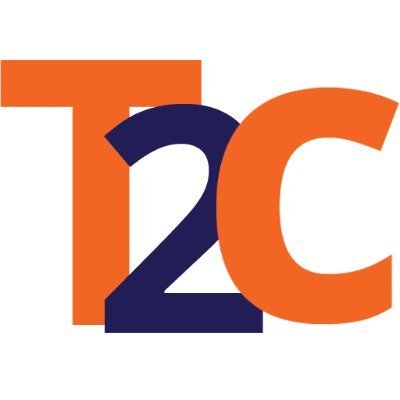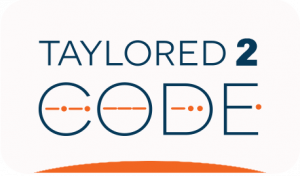
 Cassondra Preer Taylor is a newly-minted entrepreneur, the founder and CEO of Taylored 2 CODE, a tech training platform for veterans transitioning from the military to second careers in tech. A decorated Naval Intelligence officer and retired Commander, she served as the Pentagon’s liaison in the Middle East and has accumulated a few sea stories.
Cassondra Preer Taylor is a newly-minted entrepreneur, the founder and CEO of Taylored 2 CODE, a tech training platform for veterans transitioning from the military to second careers in tech. A decorated Naval Intelligence officer and retired Commander, she served as the Pentagon’s liaison in the Middle East and has accumulated a few sea stories.
Her corporate career includes marketing, consulting and process engineering roles across diverse industries from financial services to software development to biomedical R&D in juggernauts like General Electric, American Express and JP Morgan Chase. She is an alumna of GE’s prestigious Experienced Commercial Leadership Program (ECLP), an advanced pipeline for GE’s sales and marketing leadership, and Leadership Austin. Cassondra is the recipient of several awards including President Bush’s 1000 Points of Light, three graduate fellowships, multiple GE national excellence honors and nonprofit leadership accolades. 
Holding a Bachelor of Science degree in Engineering from the U.S. Naval Academy and MBA in Marketing and Strategy from the University of Michigan, Cassondra is a certified Six Sigma Black Belt and Project Management Professional (PMP). She has served on the boards of several nonprofits including BikeTexas, Austin Women in Technology and the Genesis Joy Homeless House for female vets.
When Cassondra’s not focused on making Taylored 2 CODE a staple for the transitioning vet, you’ll find her whittling down her very long travel bucket list with her camera slung over her shoulder, playing with her four-legged daughter Casper, volunteering in the community or hanging out with family and friends.
Connect with Cassondra on LinkedIn and follow Taylored 2 CODE on Facebook and Twitter.
Show Transcript
Intro: [00:00:04] Broadcasting live from the Business RadioX studios in Atlanta, Georgia, it’s time for GWBC Radio’s Open for Business. Now, here’s your host.
Lee Kantor: [00:00:18] Lee Kantor here. Another episode of GWBC’s Open for Business. And this will be a fun one. I’ve got with me today. Cassondra Preer Taylor. And she is with Taylored 2 CODE. Welcome, Cassondra.
Cassondra Preer Taylor: [00:00:31] Thank you so much. Thanks for having me.
Lee Kantor: [00:00:33] Well, tell us about Taylored 2 CODE. How are you serving folks?
Cassondra Preer Taylor: [00:00:38] Taylored 2 CODE is a ed tech platform that helps transitioning military service members pursue second careers in tech. And we do that via a hybrid online and traditional classroom educational model. So, what we have is a 15-week curriculum that’s structured in three core areas – hardware, software, and tech support. And not only do we teach in the core areas, we actually go beyond that to give our students additional soft skills to produce a tech leader as opposed to a tech specialist. Our target employment audience is actually smaller and medium-sized businesses, much like those represented in WBENC.
Lee Kantor: [00:01:16] Now, why was it important for you to serve the military?
Cassondra Preer Taylor: [00:01:20] I am a retired naval intelligence officer. So, I remember what it’s like to be a transitional vet. My dad retired from the military. He was a careered army. And it was one week that separated the time that he left the army and I joined the Naval Academy. So, I’ve been in convoys. I’ve been in some pretty terrifying situations in uniform. So, I still remember what it felt like when I was living or trying to get out, and what could be my civilian life, and more importantly, how do I even transition into that career field in my civilian life?
Cassondra Preer Taylor: [00:01:58] So, I know I can ease some of those fears for vet. I know I can because I’ve been there. And while I must say that vets appreciate the free meals on Veterans Day and the occasional upgrade, I can’t think of a single vet, especially those with families, that don’t want good jobs that allow them to care for their families. And again, I can help with that.
Lee Kantor: [00:02:20] Now, for those people who aren’t familiar, can you share a little bit about what happens when a veteran exits the military and then transitions a civilian life? I don’t think people are aware about how kind of drastic that shift is for somebody coming from military.
Cassondra Preer Taylor: [00:02:39] So, for a lot of us, we don’t want to think about wardrobe. We had a wardrobe we wear every day. People kind of think that it’s all command and control, but there’s a lot of flexibility in terms of how you lead and follow in the military. But when you’re getting ready to transition out, and for me, this is all I knew, my dad was a careered army and, basically, I’m a careered navy. So, I have never had an introduction to what could happen and what civilian careers were. I just didn’t. I didn’t know.
Cassondra Preer Taylor: [00:03:08] So, you had to come out, figure out. You’re moving your family someplace. Some people move and some people don’t. You have to figure out where you’re going to move. You move up with children again to a final place. And then, you have to figure out what you’re going to do. Most of us, we would sometimes look in the books to help us ease that transition, but you still have to figure it out before that time runs out or your leave runs out. And that’s a bit scary because, sometimes, the skill sets you develop in the military, you could be a medic, a combat medic. And there are literally some medical fields like becoming a paramedic, they don’t take you because they don’t see you’re qualified. And what could be more qualified than basically a medic, a combat medic who have seen everything in the field.
Cassondra Preer Taylor: [00:03:56] So, you have to figure out how to navigate things well enough to figure out what qualifications you need and what resources you have. There are a number of resources for VA but it is not always easy to figure out and without help.
Lee Kantor: [00:04:12] Now, in your firm, you’re the CEO of the organization. When you’re leading a company like this, what stage of a company are you before we get too far into this? Have you launched already? What stage of an organization are you?
Cassondra Preer Taylor: [00:04:28] We’re to proceed. So, COVID-19, has obviously focused on those in the post-launch phase, as it should be, because I can imagine for my friends, and family, and colleagues with small businesses, the havoc that’s been created when your dreams are being wiped away to some extent and by a virus, something as small as a virus. So, we all proceed. And I don’t have to worry about having to throw anyone because we haven’t hired staff yet, and I’m not worried about like how to cover expenses so much because our doors aren’t open yet. But we’ve still been impacted in many, many ways by COVID-19.
Lee Kantor: [00:05:10] Now, what are you doing to kind of prepare to launch? Pre-launch, is there things that you can do now that will set you up for success maybe post-COVID?
Cassondra Preer Taylor: [00:05:24] Yes. So, one of the things we were looking at was grants and funding. And unfortunately, a lot of the grants and funding opportunities and competitions have been postponed or indefinitely canceled. And while there’s no guarantee my business is going to receive through that manner in the first place. When they shut down completely, there’s like zero opportunity to receive any funding from those sources. We are still networking and meeting with advisors, but that’s been a little bit more challenging in one way because we can’t meet with them in person, but I must say that working with Zoom and Google Hangout is actually cheaper.
Cassondra Preer Taylor: [00:06:06] I have to say that my network. I’m the kind of person who tends to internalize things and not go out for help. And I’ve had to basically step back and say that I have to communicate the challenges that we’ve been having with my network. And thank God I did. Thank God I did. There are others in my boat, and my network has been rallying around in huge ways to help out, not just through with some encouragement, which have looked at us through the hard days but also through reaffirming our resources like my [indiscernible] in Atlanta. He gave us an academic development option that we had never have heard of. We were not even aware of. When we’re going to launch before, had we launch without him and what he had to say about how to go about this, we could have been in a much bigger deficit in terms of funding. So, in one way, COVID-19 has slowed us down a little, but it’s given us an opportunity, especially the resources we never knew existed.
Lee Kantor: [00:07:04] Now, are you spending some time right now to really tighten up the curriculum and get all of that as baked as it can be to prepare for the launch?
Cassondra Preer Taylor: [00:07:13] Oh, absolutely. We did try to scale back. And looking at funding and financial resources, we decided that we had to look beyond just grants and pitch competitions. We are looking at lending more. We’re looking at self-funding a bit more. And so, in doing those, we had to go about the cost quite a bit. So, instead of launching with three components, we’re launching with one. And because we launch at one, that has decreased the cost quite a bit, as well as giving us an opportunity to focus on one curriculum versus three different curriculums. So, the time has basically allowed us to basically focus a bit more. We’re also going to push our launch from or from 2020 to probably spring of 2021. Some of the experts, medical experts are predicting a second wave of COVID-19, and that could hit us, especially since we’re a school environment, pretty hard. So, we’re launching in spring of 2021, which gives us an opportunity to back and look at some resources that we did not know existed three months ago. And that’s probably not a bad thing.
Lee Kantor: [00:08:21] Now, have you had a chance to have some military folks beta test and go through the curriculum to see what they thought and what results you’re going to get?
Cassondra Preer Taylor: [00:08:33] Yes. We actually had a beta test. It was not necessarily structured around military, but we had multiple folks work with us. We ran a beta test that allowed people who are below the poverty line in Austin, Texas to essentially come in and to get training on hardware development, IT administration, system administration, server administration. And I found that my military folks were exceeding. That work ethic they have, their tenacity, their perseverance paid off. And we were seeing huge successes from a military standpoint. So, they tested it out. And we secured verbal commitments for people who were involved within that program that come with us. They’re able to actually launch this spring because, now, we are on a little bit wider locations. They’re coming on board. So, we’ve got some experience and lessons learned that we are going to be taking forward with us.
Lee Kantor: [00:09:30] Now, is it possible for you to do any launch virtually where a person can take the classes without coming into a location?
Cassondra Preer Taylor: [00:09:40] Oh, absolutely. We want most of our classes to be in person. Anyone who knows the military knows that there’s a bond that you form with the people who serve in the trenches with you, that there’s a camaraderie that I had not been able to recreate with hardly anybody else. There’s just this level of camaraderie. So, we’ve noticed that. When you get into a group like that, when you have a bad day, the group picks you up. So, we want that camaraderie because we have seen the impact of that camaraderie on attrition. So, when you’re online and virtual, you lose some of that bonding and lose that that tight-Knit feeling you would get if you were in class. We will have an online option because these days, the environment demands that, but we hope that most of our students come through the in-person because there’s a different perspective that they get in that class versus online.
Lee Kantor: [00:10:37] Now, are there any lessons that you were able to transfer from your military career into the founder of a startup career?
Cassondra Preer Taylor: [00:10:47] Yes. On your intelligence, you learned how to be good at research, you learn how to present a case, you know how to present well. That has always been a helpful thing. I would probably say that throughout my career, being a minority military officer has been a bit of a challenge. So, you learn, again, tenacity and perseverance that when people kick you down, you learn to get back up and quickly, and to pivot as you need to to get that message across. So, I would probably say that’s a big one. And coming from a tight-knit community such as the Naval Academy and the intelligence, your network is vast. It’s small but it’s vast. And you learn that this network … again, I can’t speak highly enough of of my network. There are some people who have stepped forward and said, “We have you.” And that’s big at the military.
Lee Kantor: [00:11:42] Now, you mentioned the importance of support, network, relationships. Could you talk a little bit about GWBC? Why did you get involved with that organization?
Cassondra Preer Taylor: [00:11:54] I went to a training event, useful information event in Detroit, and the advisor spoke about this, and told everyone in class that this is the only way you have to … you have to be part of this organization. And it has paid off in huge dividends. GWBC and WBENC has offered … they have given me ideas, pointed me towards grants. We’re a finalist for the Diversity Supplier Grant, that we never would have heard about hadn’t come through our email. We’re now one of 10 finalists from hundreds of people who applied for this grant. We are networking within our space with other people who are like-minded who have the same challenges that we have. I’ve heard some people say that sometimes, there’s revocations and the networking here does not help. That’s not been my stance at all. My stance has been that they are a support group. When I was ready to go after my WOSB certification at WBE, I had resources to help me with those, I had resources telling me and giving me guidance. You can’t buy that kind of support.
Lee Kantor: [00:13:07] And I think it’s one of those things where any organization you get what you put into it. So, if you think you’re gonna just pay money to join, and then not do anything or not get involved, then it probably isn’t going to work no matter what it is. But if you kind of lean into it, volunteer, reach out to people, then it might surprise you.
Cassondra Preer Taylor: [00:13:30] I totally agree. I think that you have to be engaged. This is not a one-way relationship. This is about relationship-building and [indiscernible]. Relationships take up some level of [indiscernible]. People want to give, and you have to get firm. So, I think that there definitely is an opportunity to be involved, and to take everything that they provide, and to make sure too to say thank you and to give back to them as well.
Lee Kantor: [00:13:58] Now, how could we help you? What do you need right now in the growth of your organization?
Cassondra Preer Taylor: [00:14:06] Well, mostly bottom money. But also networking. Definitely network. There are a lot of folks who have experience, not just in my space, but just from the standpoint of having to be … I wouldn’t say necessarily a spring chicken in the spring chicken at my age, but a young entrepreneur who is stepping out there. It is scary and it can be lonely. It can be very lonely. A lot of people … if it was easy, everyone would do it. So, it’s not easy. Stepping out like this, and then taking this risk comes with big risks and fears.
Cassondra Preer Taylor: [00:14:45] I would love to talk to people about their experiences and get your advice. To be able to talk to them about [indiscernible]. And that’s that’s how I probably … again, the biggest thing that’s coming from COVID-19 for me has been this network and how people have been rallying around. They’re not necessarily providing cash, but they’re pointing me in ways that makes me think a little more creatively and possibly about what I can do. And that has been huge.
Lee Kantor: [00:15:12] Well, that is a great thing to ask for. And at GWBC, I’m sure you’ll find no shortage of people willing to help. And if you want, listen to some of the episodes we’ve done on GWBCRadio.com, and you’ll hear from a lot of entrepreneurs that are grinding and battling every single day. So, please use that as a resource. And then, if you reach out to some of them, I wouldn’t be shocked if most of them would love to connect with you and help you.
Cassondra Preer Taylor: [00:15:45] Thank you so much for that. Yes.
Lee Kantor: [00:15:46] Now, Cassondra, if somebody wants to learn more about your organization, is the website up and running?
Cassondra Preer Taylor: [00:15:52] It is indeed. We are https://www.taylored2code.com.
Lee Kantor: [00:16:03] taylored2code.com. And you can get more information about Cassondra and her amazing organization. Well, you’re doing great work, but you’ve got to hang in there. Things are hard. It’s okay. You’ll get through it. Making a social impact-
Cassondra Preer Taylor: [00:16:18] Thank you.
Lee Kantor: [00:16:18] … is not easy, but it’s worth it. So, congratulations-
Cassondra Preer Taylor: [00:16:23] Thank you.
Lee Kantor: [00:16:23] … making it this far. And best of luck in the future.
Cassondra Preer Taylor: [00:16:29] Thank you so much.
Lee Kantor: [00:16:30] All right. This is Lee Kantor. We will see you all next time on GWBC Radio.
About Your Host
 Roz Lewis is President & CEO – Greater Women’s Business Council (GWBC®), a regional partner organization of the Women’s Business Enterprise National Council (WBENC) and a member of the WBENC Board of Directors.
Roz Lewis is President & CEO – Greater Women’s Business Council (GWBC®), a regional partner organization of the Women’s Business Enterprise National Council (WBENC) and a member of the WBENC Board of Directors.
Previous career roles at Delta Air Lines included Flight Attendant, In-Flight Supervisor and Program Manager, Corporate Supplier Diversity.
During her career she has received numerous awards and accolades. Most notable: Atlanta Business Chronicle’s 2018 Diversity & Inclusion award; 2017 inducted into the WBE Hall of Fame by the American Institute of Diversity and Commerce and 2010 – Women Out Front Award from Georgia Tech University.
She has written and been featured in articles on GWBC® and supplier diversity for Forbes Magazine SE, Minority Business Enterprise, The Atlanta Tribune, WE- USA, Minorities and Women in Business magazines. Her quotes are published in The Girls Guide to Building a Million Dollar Business book by Susan Wilson Solovic and Guide Coaching by Ellen M. Dotts, Monique A. Honaman and Stacy L. Sollenberger. Recently, she appeared on Atlanta Business Chronicle’s BIZ on 11Alive, WXIA to talk about the importance of mentoring for women.
In 2010, Lewis was invited to the White House for Council on Women and Girls Entrepreneur Conference for the announcement of the Small Business Administration (SBA) new Women Owned Small Business Rule approved by Congress. In 2014, she was invited to the White House to participate in sessions on small business priorities and the Affordable Care Act.
Roz Lewis received her BS degree from Florida International University, Miami, FL and has the following training/certifications: Certified Purchasing Managers (CPM); Certified Professional in Supplier Diversity (CPSD), Institute for Supply Management (ISM)of Supplier Diversity and Procurement: Diversity Leadership Academy of Atlanta (DLAA), Negotiations, Supply Management Strategies and Analytical Purchasing.
Connect with Roz on LinkedIn.
About GWBC
The Greater Women’s Business Council (GWBC®) is at the forefront of redefining women business enterprises (WBEs). An increasing focus on supplier diversity means major corporations are viewing our WBEs as innovative, flexible and competitive solutions. The number of women-owned businesses is rising to reflect an increasingly diverse consumer base of women making a majority of buying decision for herself, her family and her business. 
GWBC® has partnered with dozens of major companies who are committed to providing a sustainable foundation through our guiding principles to bring education, training and the standardization of national certification to women businesses in Georgia, North Carolina and South Carolina














